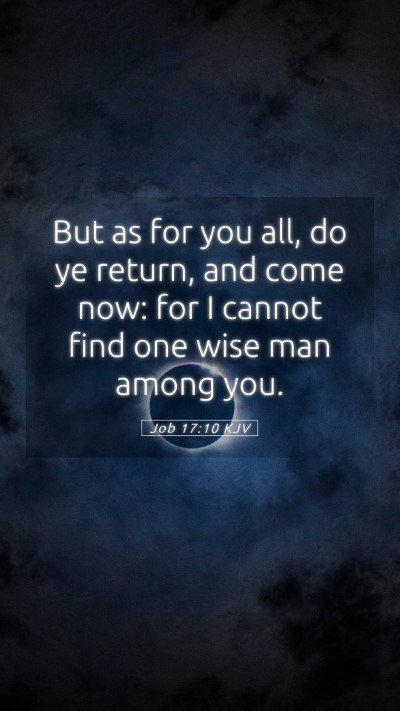Old Testament
Genesis Exodus Leviticus Numbers Deuteronomy Joshua Judges Ruth 1 Samuel 2 Samuel 1 Kings 2 Kings 1 Chronicles 2 Chronicles Ezra Nehemiah Esther Job Psalms Proverbs Ecclesiastes Song of Solomon Isaiah Jeremiah Lamentations Ezekiel Daniel Hosea Joel Amos Obadiah Jonah Micah Nahum Habakkuk Zephaniah Haggai Zechariah MalachiJob 17:10 Meaning
What is the meaning of Job 17:10?
But as for you all, do ye return, and come now: for I cannot find one wise man among you.
Job 17:10 Bible Verse Meaning
Bible Verse Commentary: Job 17:10
Job 17:10 states: "But come again, all of you, and I will not find a wise man among you." This verse reflects a moment of profound despair in Job's dialogue and highlights the theme of wisdom amidst suffering. Below is a summarized analysis based on insights from public domain commentaries by Matthew Henry, Albert Barnes, and Adam Clarke.
Context and Significance
In the broader context of the Book of Job, Job has been contending with the loss of his health, wealth, and family, grappling with questions of divine justice and human suffering. His friends have been attempting to offer explanations for his suffering, often misinterpreting his plight as punishment for sin.
Matthew Henry's Commentary Insight
Matthew Henry emphasizes that Job's statement underscores his profound disappointment in his friends. He perceives their counsel as unwise and lacking true understanding of his situation. Henry points out that Job, in his affliction, realizes that those who should provide comfort have only exacerbated his grief. This illustrates a broader problem where human wisdom fails in the face of divine mystery.
Albert Barnes' Commentary Insight
Albert Barnes focuses on the rhetorical nature of Job's statement. He interprets Job's words as a declaration of desperation, suggesting that, despite the presence of many, the wisdom necessary to comprehend divine justice is absent among them. Barnes highlights that Job’s declaration reflects an awareness of deeper truths that are often missed by those who approach suffering strictly from a theological standpoint without empathy or insight.
Adam Clarke's Commentary Insight
Adam Clarke notes the irony in Job's assertion that he will not find a wise man among his companions. Clarke explains that true wisdom, especially in the context of suffering, is often harder to discern than it appears. Job expresses a desire for genuine understanding rather than the cliched wisdom offered by his friends, indicating that true understanding requires an acknowledgment of the complexities of human suffering and divine purpose.
Key Themes and Lessons
- Human Wisdom vs. Divine Wisdom: Job’s plight reveals the limitations of human insight when faced with divine intentions.
- The Role of Friends in Suffering: The failure of Job's friends underscores the necessity of offering genuine support and compassion rather than hasty judgments.
- Disappointment and Isolation: Job’s words illustrate the emotional solitude often experienced by those in deep suffering, especially when they feel misunderstood by those closest to them.
Cross References
- Proverbs 12:15 - The way of a fool is right in his own eyes, but a wise man listens to advice.
- Ecclesiastes 7:12 - For wisdom is a shelter as money is a shelter, but the advantage of knowledge is this: wisdom preserves those who have it.
- Job 6:24 - Teach me, and I will be silent; make me understand how I have gone astray.
Application and Reflection
When studying Job 17:10, consider the following reflections:
- In moments of suffering, are we quick to offer solutions rather than listening and understanding?
- How do we respond to the hardships of others? Do we offer genuine empathy or misguided advice?
- What do we learn about the nature of wisdom through Job’s experiences and words?
Conclusion
This verse serves as a poignant reminder of the complexities associated with human suffering and the often insufficient wisdom of mankind when confronting divine mysteries. Engaging with Job 17:10 through various commentaries encourages a deepened understanding of Scripture, enriching Bible study insights especially in the context of suffering. As you delve into your own Bible study, consider using tools and resources that allow you to explore the word of God more deeply.


